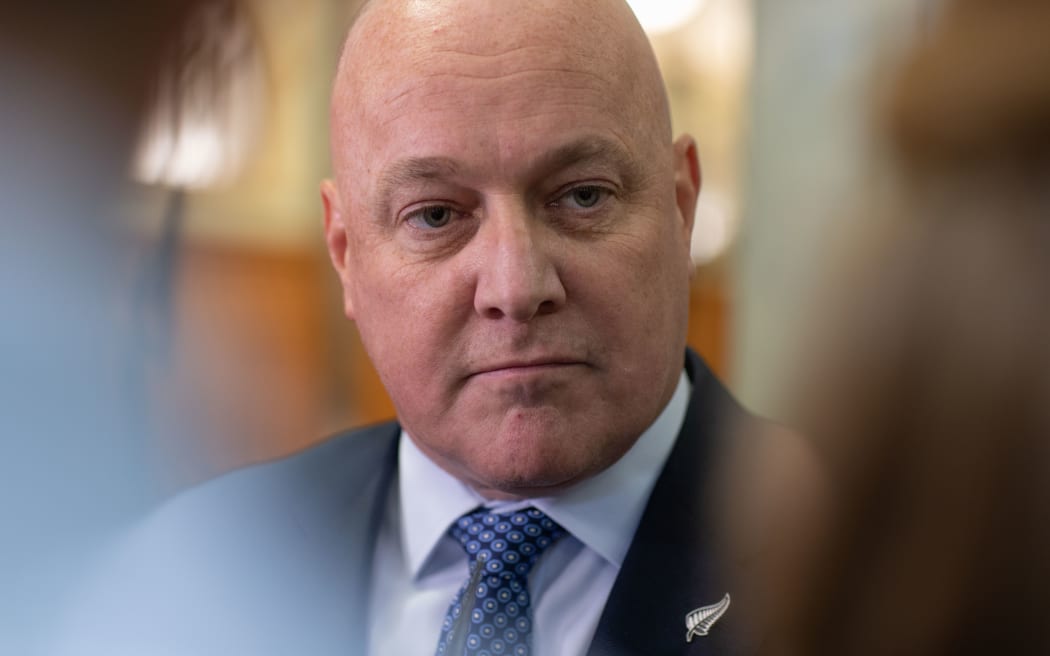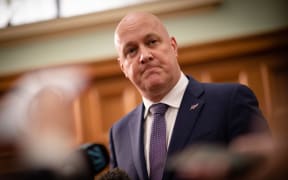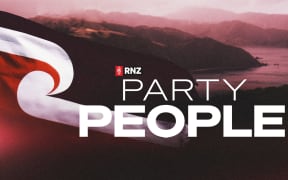
National Party leader Christopher Luxon says support systems such as Working for Families and accommodation supplements can be used in addition to tax cuts to help those on lower incomes. Photo: RNZ / Angus Dreaver
The National Party is dismissing claims the wealthiest will benefit most from its proposed tax cuts.
National has pledged to index tax thresholds to inflation if elected, and to remove the 39 percent top tax rate.
The Council of Trade Unions (CTU) said that under National's proposal those earning the most - and property investors - stood to gain a combined $5.8 billion, equating to more than half of the value of the tax cuts.
Those on lower incomes, by comparison, would see just 6 percent of the tax cuts' value returned to them, according to the New Zealand Council of Trade Unions (CTU).
Luxon told Morning Report he did not accept the CTU's numbers and noted the government had "other tools" such as Working for Families and accommodation supplements at its disposal to help workers on lower incomes.
"Tax isn't the only support we can do to help those people," he said.
"There's other tools that the government has - and does use - to support those low-income workers."
The core part of National's tax policy was to inflation-adjust tax thresholds, as many other developed countries around the world did, Luxon said.
"We're not changing the tax system in New Zealand: it's a progressive tax system, the top 10 percent of tax payers pay over 40 percent of our income tax in this country."
"We're just saying, take the current progressive tax system, for goodness' sake, and do what many developed countries around the world [do]."
He said the current government had raised $15,000 per household in extra tax.
"It's spending a billion dollars more in government spending each and every week."
'We are strong advocates of free speech'
Prime Minister Jacinda Ardern said at this week's He Whenua Taurikura hui on terrorism that she would be seeking cross-party support for its proposed new hate speech laws.
Luxon said the National Party had yet to see any detail on the potential new measures the government planned to introduce, but that the party strongly supported free speech.
"We don't actually see a need for hate speech laws."
He said National understood the concerns raised by the Royal Commission about hate speech, but cautioned they had to be weighed against free speech and said the party did not see any need to change the country's hate speech laws "today".
"Having said that, we'll look at what the government's proposing, when it gets it on paper and puts it into detail."
Luxon said the last time the government talked about tweaking the hate speech laws it was "incredibly confusing and a total debacle".
"We are strong advocates of free speech, we'll continue to support that strongly ... let's see what [the government is going to] say, and then we'll balance it against our free speech commitments.
Justice Minister Kiri Allan told TVNZ's Q&A programme the new laws should be in place by the next election.
'Enduring' water solution will rely on discussion with councils
Luxon said National wanted communities to retain ownership of their local water assets and the government's "roughshod" approach to pushing through its three waters reforms were unpopular "up and down the country".
"It's not a one-size-fits-all proposal, and that's why the government's one-size hasn't worked and it's not been bought into by communities or councils," he said.
"We think the government should frankly abandon the proposal and get in the room with the councils and find an enduring solution."
The costs and scale benefits the government had talked about based on the Scottish model were "unrealistic" he said, and cross-subsidisation would see well-managed councils subsiding poorly-managed councils.
"We think, fundamentally, we can actually make targeted interventions where we've got poor water quality assets and between central and local government work out how to fund it."
Luxon said National had worked closely with Communities for Local Democracy (the group of mayors opposed to three waters) and it was comfortable with a lot of the suggestions proposed by that group.
"We just should get in the room with the councils and nut it out and actually agree on the final detail of it."






